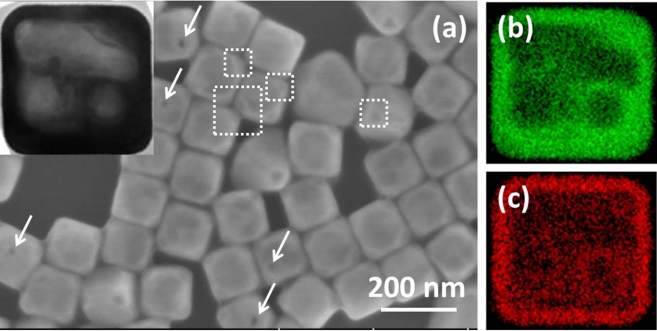Your current location:
- Home>
- Achievements>
- Research Papers
Controllable corrosion-assisted fabrication of Au-Ag alloyed hollow nanocrystals for highly efficient and environmentally-stable SERS substrates
Author: Guo Jing ;Lu Fang;Zhang Yugang;Ma Qilin;Yang Shaosong;Liu Guangqiang;Cai Weiping
Periodical: NANOTECHNOLOGY
Page: ¾í: 29 ÆÚ: 45
Full text link: https://iopscience.iop.org/article/10.1088/1361-6528/aade27/pdf

Periodical: NANOTECHNOLOGY
Page: ¾í: 29 ÆÚ: 45
Full text link: https://iopscience.iop.org/article/10.1088/1361-6528/aade27/pdf

Surface enhanced Raman scattering (SERS) substrates with both high activity and long term chemical-stability have been expected in the practical application of the SERS-based detection. In this paper, Au-Ag bimetal nanocrystals are fabricated based on the template-etching reaction in the Ag nanocubes-contained cetylpyridinium chloride (CPC) aqueous solution via adding the HAuCl4 solution. The obtained nanocrystals are Au-Ag alloyed and hollow in structure. Further, it has been found that with the increasing Au/Ag molar ratio, the shape of the alloyed nanocrystals evolve from the truncated nanocubes to the hollow boxes and then nanocages, showing the ever red-shifting surface plasmon resonance from the visible to the infrared region. The formation of the alloyed hollow nanocrystals is attributed to the preferential dissolution of the Ag nanocubes induced by CPC selective adsorption and the three to one galvanic replacement reaction between Ag and Au atoms. Importantly, such Au-Ag alloyed hollow nanocrystals, especially the ones with a low Au/Ag atomic ratio, show both high SERS activity and long term environmental stability compared with pure Ag or Au nanocrystals, and are the ideal candidate for the SERS substrate with practical application value. This work not only demonstrates the nanofabrication route to the alloyed hollow nanocrystals with controllable shapes and tunable optical properties in a large region, but also presents highly active and chemically-stable SERS substrates for the practical SERS-based detection.
Previous: Rapid and ultrasensitive surface-enhanced Raman spectroscopy detection of mercury ions with gold film supported organometallic nanobelts
Next: Porous zeolite imidazole framework-wrapped urchin-like Au-Ag nanocrystals for SERS detection of trace hexachlorocyclohexane pesticides via efficient enrichment
Next: Porous zeolite imidazole framework-wrapped urchin-like Au-Ag nanocrystals for SERS detection of trace hexachlorocyclohexane pesticides via efficient enrichment
